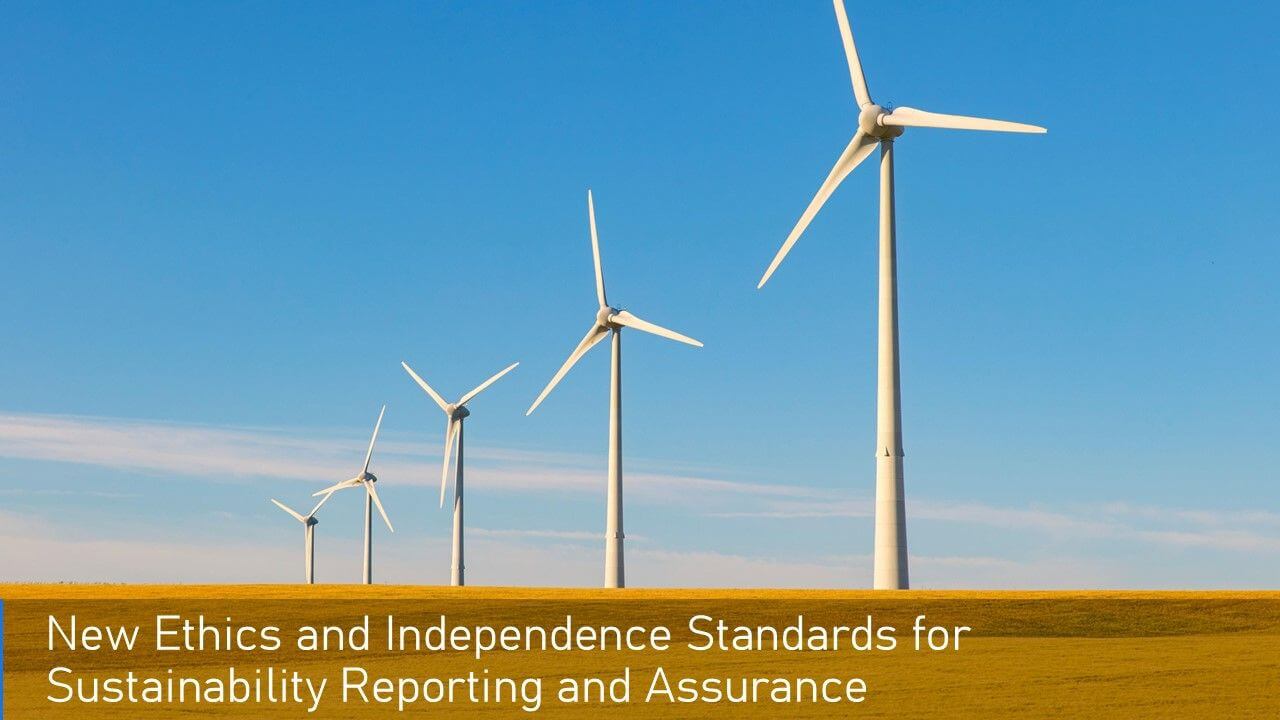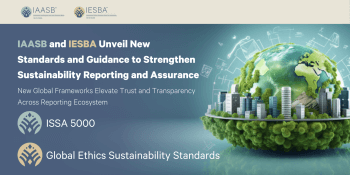Sustainability

Sustainability
The sustainability regulatory environment is rapidly evolving, driven by the increased demand from investors, those charged with governance, the public and other stakeholders for sustainability and ESG reporting and assurance. International standard-setters (ISSB, IESBA and IAASB) and local standard setters (AUASB and AASB) have released sustainability reporting and assurance standards to address these concerns.
APESB have developed sustainability-related ethical and independence standards for the Australian environment. Further details on the issued amending standard to the Code of Ethics is set out below or on APESB’s Sustainability Project Page.
Sustainability Ethics and Independence Standards
Accounting Professional & Ethical Standards Board (APESB)

On 8 July 2025, APESB released a landmark Amending Standard to APES 110 Code of Ethics for Professional Accountants (including Independence Standards) (the Code), setting out new ethical and independence requirements for sustainability reporting and assurance in Australia.
These new standards provide clear and robust ethical principles and guidance for professional accountants engaged in sustainability reporting and assurance in Australia, including using the work of external experts. They support Australia’s mandatory climate-related financial disclosures and sustainability reporting, which became effective for Group 1 entities from 1 January 2025.
The standards are based on the IESBA’s global ethics and independence standards on Sustainability and Use of External Experts released in January 2025 (see below).
The new requirements will take effect from 1 January 2026, with a later implementation date of 1 July 2028 for provisions related to the value chain components. Early adoption is encouraged, with transitional relief options available to support implementation.
Further details are in the APESB’s Media Release and Basis for Conclusions.
International Ethics Standards Board for Accountants (IESBA)

IESBA Sustainability Ethics and Independence Standards
In January 2025, the IESBA released two final pronouncements on ethics standards for sustainability reporting and assurance:
- International Ethics Standards for Sustainability Assurance (IESSA) and related revisions to the International Code of Ethics for Professional Accountants (including International Independence Standards), and
- Revisions to the Code on the Using the Work of an External Expert.
The IESBA final pronouncements will be effective from 15 December 2026, except for the provisions applicable to value chain components, which will be effective from 1 July 2028. Early adoption is permitted and encouraged. Further details are in the IESBA Media Release.
The IESBA also published a range of guidance and publication materials on the standards and held a series of webinars.
Read the Ethics for Sustainability Reporting Fact Sheet, the Ethics & Independence for Sustainability Assurance (IESSA) Fact Sheet and the Using the Work of an External Expert Fact Sheet.
IESBA Sustainability Reference Group
On 30 June 2023, the IESBA announced the establishment of the Sustainability Reference Group (SRG) to support the work of its Sustainability Task Force. The SRG members serve as a “sounding board” to the Sustainability Taskforce, providing insights, expertise and guidance in the development of worldwide ethics and independence standards for sustainability reporting and assurance. APESB CEO and IESBA Vice Chair Mr. Channa Wijesinghe chairs the SRG. Read the IESBA Media Release.
IAASB and IESBA released FAQs on Sustainability Assurance
In June 2025, the IAASB and IESBA Staff released two new publications to support the implementation of the IAASB’s and IESBA’s global Sustainability-related standards.
- Joint IAASB and IESBA FAQs on Sustainability Assurance Engagements address practical questions about applying the International Standard on Sustainability Assurance (ISSA 5000) and the International Ethics Standards for Sustainability Assurance (IESSA) together.
- IESBA Staff Q&As on IESSA focuses on ethics and independence considerations for practitioners performing sustainability assurance engagements.
Further details are available in the IESBA Media Release.
IAASB and IESBA launched new feedback mechanism to gather implementation insights on Sustainability standards
In June 2025, the IAASB and IESBA launched a new online mechanism to gather feedback on its respective Sustainability standards and created Monitoring and Implementation Groups under each Board to identify any practical implementation matters related to its issued Sustainability-related standards.
Online submissions for the IESSA and ISSA 5000 can be made on the IESBA’s website and the IAASB’s website, respectively.

Australian mandatory climate-related disclosures and sustainability reports
In September 2024, amendments were made to Chapter 2M of the Corporations Act 2001 to establish mandatory climate-related reporting requirements for Australian entities.
From 1 January 2025, large entities that prepare and lodge financial reports under Chapter 2M must prepare a sustainability report and lodge the report, alongside the entity’s financial report and directors’ report, with ASIC.
These new reporting requirements will be phased in over three years based on size, beginning with the largest entities, asset owners and NGER reporters.
ASIC Guidance on Sustainability Reporting
On 31 March 2025, ASIC released Regulatory Guide 280 Sustainability reporting to assist entities in preparing sustainability reports containing climate-related financial information under Chapter 2M. This may include companies (including registered corporations under the National Greenhouse and Energy Reporting Act 2007), registered schemes, registrable superannuation entities and retail corporate collective investment vehicles.
Australian Sustainability Reporting Standards
Australian Accounting Standards Board (AASB)
AASB Sustainability Reporting Standards
The AASB has issued two Australian Sustainability Reporting Standards (ASRS) which are effective for annual reporting periods beginning on or after 1 January 2025:
- AASB S1 General Requirements for Disclosure of Sustainability-related Financial Information (voluntary standard); and
- AASB S2 Climate-related Disclosures (mandatory standard).
AASB S2 requires disclosure of information about climate-related risks and opportunities that could reasonably be expected to affect the entity’s cash flows, access to finance or cost of capital over the short, medium or long term. This applies to climate-related physical risks, climate-related transition risks and climate-related opportunities.
AASB S1 sets out voluntary disclosures for information about all sustainability-related risks and opportunities that could reasonably be expected to affect the entity’s cash flows, its access to finance or cost of capital over the short, medium or long term.
AASB S1 and AASB S2 are closely aligned with the standards developed by the ISSB’s IFRS S1 and IFRS S2.
Australian Standards on Sustainability Assurance
Australian Auditing and Assurance Standards Board (AUASB)

On 28 January 2025, the AUASB approved two Australian Standards on Sustainability Assurance (ASSAs):
- ASSA 5000 General Requirements for Sustainability Assurance Engagements, which aligns to IAASB’s ISSA 5000; and
- ASSA 5010 Timeline for Audits and Reviews of Information in Sustainability Reports Under the Corporations Act 2001.
ASSA 5000 applies to sustainability assurance engagements for reporting periods beginning on or after 1 January 2025 and as at a specific date on or after 1 January 2025.
For mandatory climate reporting under the Corporations Act 2001, ASSA 5000 is subject to the phasing in of limited and reasonable assurance under ASSA 5010.
ASSA 5010 identifies the AASB S2 disclosures in sustainability reports that must be assured and/or reviewed for financial years commencing between 1 January 2025 and 30 June 2030. ASSA 5010 is aligned with the requirements of the Corporations Act 2001 for reasonable assurance of all climate disclosures, including Scope 3 emissions, from years commencing on or after 1 July 2030.
In relation to Scope 3 emissions, there is no assurance requirement in the first year of assurance (Year 1), with limited assurance starting in the entity’s second year of assurance (Year 2), as listed below for the groups:
– Group 1 – financial years beginning on or after 1 July 2026;
– Group 2 – financial years beginning on or after 1 July 2027; and
– Group 3 – financial years beginning on or after 1 July 2028.
The AUASB has determined to refer to the current APES 110 in respect of applicable Sustainability Assurance Engagements performed for periods beginning from 1 January 2025. The AUASB will, in due course, consider adopting a revised APES 110 after the APESB issues it from the APESB’s effective date of 1 January 2026.
AUASB standard ASAE 3410 Assurance Engagements on Greenhouse Gas Statements will continue to apply until reporting periods commencing 15 December 2026 for separate emissions reporting where required under Australia’s National Greenhouse and Energy Reporting Act 2007.
International Sustainability Disclosure Standards
International Sustainability Standards Board (ISSB)
In July 2023, the ISSB released the first two IFRS Sustainability Disclosure Standards:
- IFRS S1 General Requirements for Disclosure of Sustainability-related Financial Information; and
- IFRS S2 Climate-related Disclosures.
The standards are effective from 1 January 2024, but individual jurisdictions may elect a different date for adoption.
In July 2023, the International Organization of Securities Commissions (IOSCO) announced its endorsement of the ISSB standards. The IOSCO have called on its 130 member jurisdictions to consider how they can incorporate the ISSB standards into their respective regulatory frameworks to deliver consistency and comparability of sustainability-related disclosures worldwide.
International Sustainability Assurance Standards
International Auditing and Assurance Standards Board (IAASB)
In November 2024, the IAASB issued the International Standard on Sustainability Assurance (ISSA) 5000, General Requirements for Sustainability Assurance Engagements. In jurisdictions that adopt it, ISSA 5000 is effective for periods beginning on or after 15 December 2026
ISSA 5000 will serve as a comprehensive, stand-alone standard suitable for any sustainability assurance engagements. It will apply to sustainability information reported across any sustainability topic and prepared under multiple frameworks. ISSA 5000 is also profession agnostic, supporting its use by both professional accountant and non-accountant assurance practitioners.
To complement this release, the Board also issued Basis for Conclusions, Fact Sheet, Frequently Asked Questions, Implementation Guide, Global Baseline Standards for Sustainability Assurance and Technology Position.
Further information on ISSA 5000 can be found on IAASB’s website.
Latest updates - APESB Board Meetings
Previous updates can be found on the Board Meetings and Sustainability Project webpages.

Project Lead
Project Lead
APESB mobile app
Access APESB pronouncements on the go.
Register for APESB Updates





